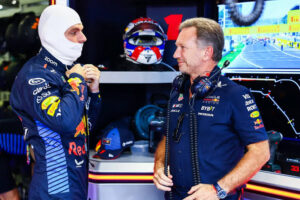Just in:FIA CONFIRM latest exit as staff continue to leave F1 governing……read more

FIA CONFIRM latest exit as staff continue to leave F1 governing……read more
The FIA is facing yet another major departure amidst a series of personnel changes that have rocked the organization in recent months. The latest exit is that of Andrew Wheatley, the FIA’s road sport director, whose departure follows several other high-profile resignations. This latest shakeup comes just ahead of the Formula 1 Abu Dhabi Grand Prix, where the 2024 constructors’ championship will be decided between McLaren and Ferrari. This event also marks the emotional final appearance of Lewis Hamilton for Mercedes, as he prepares to move to Ferrari in 2025.
Recent months have been turbulent for the FIA, the governing body of motorsport, particularly with growing concerns over its leadership and management. President Mohammed Ben Sulayem, who has overseen the FIA during this time, has come under scrutiny for various issues, including staff departures and criticisms about the FIA’s ability to manage its operations effectively. The FIA’s challenges have been magnified by the exit of several key staff members who have played significant roles in the governing body’s operations, notably within Formula 1 and other motorsport categories.
Not long ago, the FIA saw the resignation of Niels Wittich, who served as F1’s race director. His departure came just a month after Luke Skipper, the FIA’s communications director, and Jacob Bangsgaard, the secretary-general of mobility, also left their positions. These departures have sparked ongoing discussions about the stability of the FIA and its capacity to handle the growing demands of modern motorsport, especially as Formula 1 continues to gain global popularity and increase its commercial influence.
In addition to Wittich, experienced Formula 2 race director Janette Tan and veteran race steward Tim Mayer also resigned their roles in the past few weeks. This series of exits has created a sense of uncertainty within the organization, and reports suggest that the FIA is struggling to replace these key figures. The resignation of Andrew Wheatley adds to this growing list of departures, further indicating a period of upheaval for the FIA.
Wheatley, a former rally driver, expressed his gratitude for his time with the FIA and reflected on his experience working with the organization. In a statement to Autosport, he said, “It has been a privilege and an education to work as part of the FIA team and witness the hard work and dedication of not only my colleagues but also the innovation, ingenuity, and bravery of the competitors.” He also acknowledged the role of event organizers and volunteers, recognizing their tireless efforts in supporting motorsport events worldwide. Wheatley emphasized his confidence in the work being done in rally and off-road environments, expressing optimism that these efforts would lay a strong foundation for the future of these motorsport categories.
Despite Wheatley’s positive remarks, the fact that he has chosen to leave at a time of such significant instability within the FIA raises questions about the organization’s future leadership. As of now, it remains unclear who will take over Wheatley’s role as road sport director in the upcoming season. This uncertainty, combined with the earlier exits of several high-level figures, highlights ongoing concerns about the FIA’s ability to maintain stability in the face of challenges.
The FIA’s leadership struggles come at a time when Formula 1 is more popular than ever, with major manufacturers like Ferrari, McLaren, and Mercedes competing fiercely for supremacy in both the drivers’ and constructors’ championships. The ongoing changes within the FIA’s hierarchy add to the complexity of managing F1’s growing commercial and competitive landscape. With the final race of the 2024 season in Abu Dhabi just days away, all eyes are on the future of Formula 1 and its governing body, especially as some of the most significant names in motorsport, including Hamilton, prepare to make major transitions.
As the FIA continues to grapple with these challenges, its ability to stabilize and provide effective leadership will be critical in maintaining the integrity and success of motorsport in the years to come. The governing body must address these staffing concerns and ensure that it can provide strong leadership to oversee the sport’s future growth and innovation.





